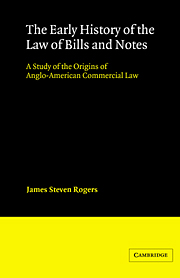 The Early History of the Law of Bills and Notes
The Early History of the Law of Bills and Notes Published online by Cambridge University Press: 22 September 2009
Having examined how early exchange transactions were actually conducted, we can now trace the development of the law of exchange and bills of exchange. This chapter examines the private law of exchange contracts in the period up to the early part of the seventeenth century. Just as the common view that the early common law courts did not handle commercial cases in general proves false, careful examination of the evidence indicates that the common law courts, as well as other courts in England, did entertain actions to enforce the obligations of parties to exchange transactions long before the seventeenth century.
EXCHANGE CONTRACTS IN THE MERCANTILE COURTS
In seeking evidence of how courts treated exchange transactions, one must be careful to avoid being misled by incidental references to bills of exchange in early cases that did not actually involve any dispute concerning the rights and obligations of the parties to the exchange transaction. For example, an entry in the London Mayor's Court Rolls dating from 1300 is commonly cited as the earliest action on a bill in the English mercantile courts. The entry, however, merely records that a chaplain complained that his rector had stolen money and delivered it to an Italian merchant in London who gave him a letter of payment addressed to his correspondent in Paris. The Italian merchant said that he had written to his correspondents in various cities asking them not to pay the money, but he had not yet learned whether it had already been paid.
To save this book to your Kindle, first ensure [email protected] is added to your Approved Personal Document E-mail List under your Personal Document Settings on the Manage Your Content and Devices page of your Amazon account. Then enter the ‘name’ part of your Kindle email address below. Find out more about saving to your Kindle.
Note you can select to save to either the @free.kindle.com or @kindle.com variations. ‘@free.kindle.com’ emails are free but can only be saved to your device when it is connected to wi-fi. ‘@kindle.com’ emails can be delivered even when you are not connected to wi-fi, but note that service fees apply.
Find out more about the Kindle Personal Document Service.
To save content items to your account, please confirm that you agree to abide by our usage policies. If this is the first time you use this feature, you will be asked to authorise Cambridge Core to connect with your account. Find out more about saving content to Dropbox.
To save content items to your account, please confirm that you agree to abide by our usage policies. If this is the first time you use this feature, you will be asked to authorise Cambridge Core to connect with your account. Find out more about saving content to Google Drive.